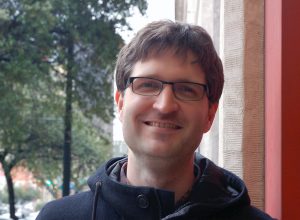 “Mom said I came out of the womb flipping switches,” said CS alumnus Kyle Derr. “I always wanted to know how air conditioning works, how light switches work. When I was much younger, I wanted to do hardware. But in software the results are more immediate. You change a line of code and the results are completely different.”
“Mom said I came out of the womb flipping switches,” said CS alumnus Kyle Derr. “I always wanted to know how air conditioning works, how light switches work. When I was much younger, I wanted to do hardware. But in software the results are more immediate. You change a line of code and the results are completely different.”
Even though Derr could write code when he got to Rice, he struggled with some of the early CS curriculum, especially the theory. “Those first classes were tough. I have a ton of respect for both Scott and Luay, and I loved taking classes from both of them. The way they’ve evolved the introductory curriculum today would have helped me when I was at Rice.”
During his Rice years, Derr worked for CS professor Dan Wallach on voting security and was also close to Alan Cox, another CS professor. Derr said, “That’s the thing about Rice; you can develop relationships with professors doing real work, doing real things. I graduated near the beginning of the financial crisis and had a hard time finding a job. I reached out to Alan and he sent my resume to IronPort, who had acquired his company. That was the sort of personal reference I really needed to start my career somewhere great.”
Derr believes one of Rice’s particular strengths is its curriculum flexibility. “You can explore every facet of your intellect at Rice,” he said. “There are plenty of great computer science schools, but Rice is unique because the curriculum is loose enough to accommodate multiple interests. I was a double major: CS and Philosophy. As you move up through leadership roles, your job is about more than just coding. What features should we build? Should we not build? Which would make the most of our users happy? The discussions we had in my philosophy classes, where I learned how to construct an argument, apply just as much to my role now as my CS degree. As a manager or executive, you are required to utilize social acumen, listen to other people, repeat back what they say and make tweaks, or make suggestions. These are all skills I learned as a philosophy major.”
For a few years, he tried working on the west coast. “I moved to California and hated California,” Derr said. “I like houses and backyards. I don’t like sharing walls with other people. But whether you want to go big or go small, you don’t have to leave Texas. I didn’t have much luck finding a job in Austin in 2008. But I got here as soon as I could, and today, there are lots of new startups in Austin, and some of the major west coast tech companies are opening offices here. So whether you want to work at a global giant or a startup, you’ve got lots of options.”
For Derr, his favorite job depends less on the size of the company and more on the project and its impact on society. He enjoys the challenge of starting up a new project, but he also wants to work on projects that matter.
He said, “It is sometimes hard to stay in this business and work on things that matter. Other people want to work on video platforms, or social media. But our world has all these major problems to solve and it makes those things seem so trivial. I don’t want to work on organizing your tweets or helping a 16-year old manage their photos, I try to work on things that help solve problems. Like my work at Civitas, where they are trying to get one million more kids through college. We can’t lose citizens of our country [to their struggle with poverty and unemployment] just because they fall through the cracks of our higher education system.”
Although he was and is proud of the work Civitas is doing, Derr accepted another new and impactful challenge. He is now the Systems Architect at AllClear in Austin. “At AllClear, we’re trying to solve the online identity crisis,” he said. “Today, there is no real good way to prove to a website who you are. When the stakes are high, this can lead to real fraud. But, we are at a cool time in history when everyone is carrying around a phone that is also an internet connected fingerprint sensor. We might be able to offer a product that can finally kill the password.”
Kyle Derr completed his B.A. with a double major in CS and Philosophy in 2008.